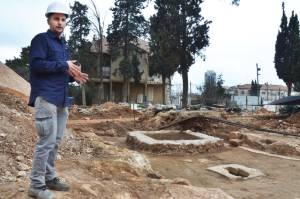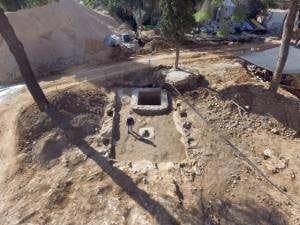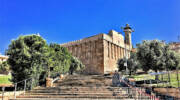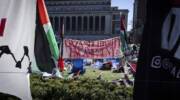
The uncovered winery. (IAA)
In testament to the rich history of the Land of Israel, construction crews working on a building site discovered a Roman-era manor in the heart of Jerusalem.
A large and impressive 1,600 years old winery dating to the Roman or Byzantine period with a pressing surface paved with a white mosaic was uncovered in the heart of Jerusalem at the site which served the residents of a large manor house which engaged in wine production.
The unexpected archaeological discovery was discovered during preparations for the construction of residential buildings at Jerusalem’s famous Schneller Compound.
The Schneller Orphanage at the compound was operated by Germans in Jerusalem from 1860 until the Second World War. During the British Mandate, its German inhabitants were expelled and a military base was established there. After the British withdrawal in 1948 the compound was turned over to the Hagana and later served as an army base used by the IDF until 2008.
Interesting and assorted finds from Jerusalem’s past were discovered in the archaeological excavation, most notably the winery. The complex installation includes a pressing surface paved with a white mosaic. In the center of it is a pit in which a press screw that aided in extracting the maximum amount of must from the grapes was anchored.
Eight cells were installed around the pressing surface. These were used for storing the grapes, and possibly also for blending the must with other ingredients, thereby producing different flavors of wine. The archaeologists believe that this winery served the residents of a large manor house whose inhabitants made their living by, among other things, viticulture and wine production.

Aerial view of the winery. (Guy Fitoussi/IAA)
Evidence was unearthed next to the impressive wine press which indicates the presence of a bathhouse. These finds included terra cotta pipes used to heat the bathhouse and several clay bricks, some of which were stamped with the name of the Tenth Roman Legion. This legion was one of four Roman legions that participated in the conquest of Jewish Jerusalem in the second half of the first century, and its units remained garrisoned in the city until around 300 CE.
Among the Roman legion’s main centers was the one in the vicinity of Binyanei Ha-Uma, located just 800 meters from the Schneller Compound, where a large pottery and brick production center was situated.
The archaeologists suggest that the Schneller site, in the form of a manor house, constituted an auxiliary settlement to the main site that was previously exposed at Binyanei Ha-Uma. As was customary in the Roman world, here too, in the Schneller Compound, a private bathhouse was incorporated in the plan of the estate.
The current archaeological exposure is actually a continuation of the salvage excavations that were carried out at the site a half a year ago when evidence was uncovered there of a Jewish community that dated to the late Second Temple period.
Archaeology Everywhere in Jerusalem
According to archaeologist Alex Wiegmann, excavation director on behalf of the Israel Antiquities Authority (IAA), “once again, Jerusalem demonstrates that wherever one turns over a stone ancient artifacts will be found related to the city’s glorious past. The archaeological finds discovered here help paint a living, vibrant and dynamic picture of Jerusalem as it was in ancient times up until the modern era.”
By: Max Gelber, United with Israel

Free Ebook: 10 Best Places to Visit in Israel
The Land of Israel has provided the backdrop for some of the most important events in human history. From the Old City in Jerusalem to the Sea of Galilee, people from all over the globe visit the Holy Land each year to take in the breathtaking scenery and inspiration of Israel. Now you can experience this beauty for yourself from the comforts of home and maybe plan a trip of your own to Israel. Get the free, exclusive eBook from United with Israel: The 10 Best Places to Visit in Israel.
Do You Love Israel? Make a Donation - Show Your Support!
Donate to vital charities that help protect Israeli citizens and inspire millions around the world to support Israel too!
Now more than ever, Israel needs your help to fight and win the war -- including on the battlefield of public opinion.
Antisemitism, anti-Israel bias and boycotts are out of control. Israel's enemies are inciting terror and violence against innocent Israelis and Jews around the world. Help us fight back!






















